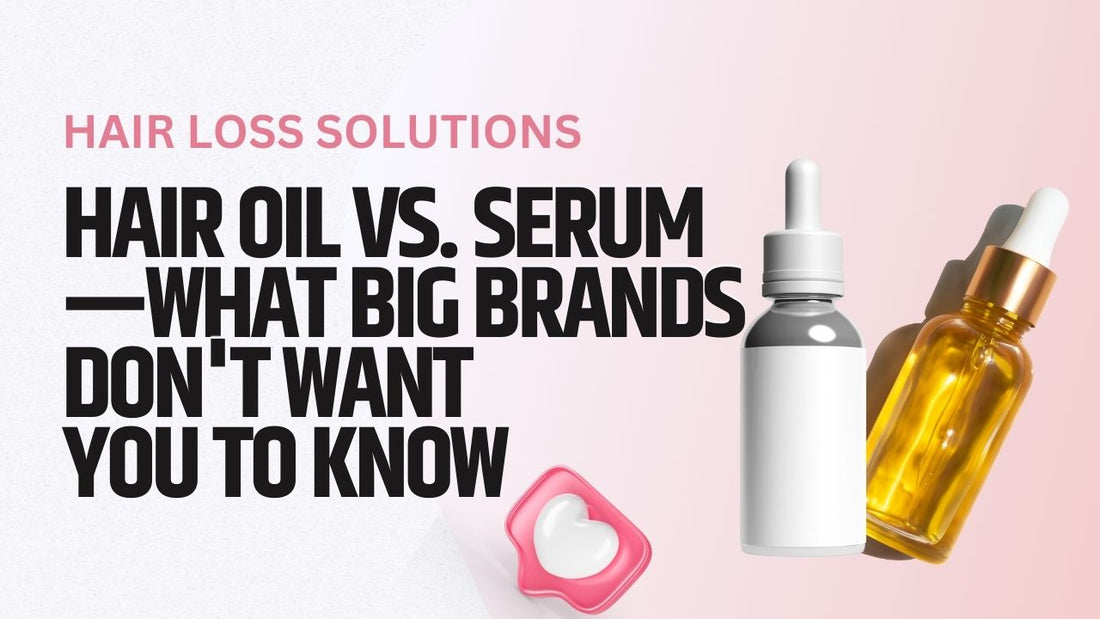
Hair Oil vs. Serum—What Big Brands Don't Want You to Know
Share
In the rapidly evolving realm of personal care and beauty, the Hair Oil vs. Serum debate remains a hot topic. With an insatiable demand for hair products that promise the moon, most of us are guilty of hoarding a plethora of items, including but not limited to hair oils and serums. Yet, when it comes to choosing between Hair Oil vs. Serum, many are left puzzled and, quite literally, scratching their heads. This comprehensive guide is designed to demystify the Hair Oil vs. Serum conundrum, equipping you with the critical knowledge to make informed, effective choices for your hair care regimen.

What is Hair Oil?
Definition and Origins
Hair oil is as old as civilization itself. For centuries, people have relied on the natural oils extracted from plants, seeds, and fruits to nourish their hair. But what exactly is hair oil? Simply put, hair oil is a lubricating agent designed to imitate the natural oils produced by your scalp.

Types of Hair Oils
Coconut Oil
Coconut oil is the darling of the haircare world. Rich in fatty acids and lauric acid, it penetrates deep into the hair shaft, nourishing it from within.
Argan Oil
Referred to as 'liquid gold,' Argan oil is rich in antioxidants and provides a silky texture to your hair. It is especially beneficial for frizzy and unmanageable hair.
Jojoba Oil
This oil mimics the natural oil sebum, which is produced by your scalp. It is lightweight and doesn't weigh your hair down, making it ideal for those with oily hair.
Common Uses and Benefits
Hair oils are multitaskers. They can be used for deep conditioning, detangling, and even as a heat protectant. The fatty acids and nutrients present in oils help to strengthen the hair, reduce frizz, and add a natural shine.
How to Properly Use Hair Oil
Applying hair oil is not as straightforward as slathering it onto your scalp. For effective results, heat the oil slightly and apply it to the scalp and hair lengths. Leave it on for at least 30 minutes before washing it off with a mild shampoo.
What is a Hair Serum?
Definition and Origins
As we transition into the world of hair serums, it's essential to understand what sets them apart from oils. Unlike the natural origins of hair oil, hair serums are typically synthetic products designed to coat the surface of your hair. Created in the labs, serums are specifically engineered to tackle a variety of hair issues like frizz, dryness, and damage.
Types of Hair Serums
Silicone-Based Serums
These are the most common type of hair serums. They are effective in adding a layer of shine and smoothness to your hair but are not ideal for long-term health.
Water-Based Serums
For those who shy away from silicones, water-based serums offer a lightweight alternative that provides hydration without weighing the hair down.
Protein-Based Serums
These serums are formulated with protein that helps in strengthening hair strands, making them ideal for damaged or brittle hair.
Common Uses and Benefits
Hair serums offer a quick fix for unruly hair. They protect against environmental aggressors like heat and humidity, manage frizz, and can even offer UV protection. In contrast to hair oils, serums provide a more temporary and instant solution to your hair problems.
How to Properly Use Hair Serum
Serums are best applied on damp, towel-dried hair. Take a small amount and rub it between your palms, then glide it through the length of your hair, avoiding the scalp. It's a leave-in product, so there's no need to wash it off.
Hair Oil vs. Serum: The Comparison
Ingredient Composition
When it comes to ingredient composition, hair oils are generally more natural, while serums are often filled with synthetic compounds designed for immediate results.
Long-term Benefits and Drawbacks
Hair oils offer long-term nourishment and are generally considered better for overall hair health. On the other hand, while serums offer quick fixes, they may not provide long-term benefits and can sometimes lead to product buildup.
Cost-Efficiency
Hair oils often prove to be more cost-efficient. A small quantity goes a long way, and they serve multiple purposes. Serums, however, are more specialized and can be on the pricier side.
Who Should Use What?
For those looking for deep nourishment and are willing to invest time in their haircare routine, hair oils are the way to go. If you're looking for quick solutions and are always on the go, serums might be your best friend.
The Hidden Truths: What Big Brands Don't Want You to Know
In the competitive market of haircare, big brands often make sweeping claims about their products. However, what they don't tell you is that no product is a 'one-size-fits-all.' Personalization based on your hair type, lifestyle, and specific needs is key.

This brings us to the end of the second section of our detailed guide. In the final part, we'll wrap things up with some quick FAQs and a compelling conclusion that will help you make an informed choice between hair oils and serums. Stay tuned!
FAQs:
What is better for hair growth: oil or serum?
When it comes to promoting hair growth, oils that penetrate the hair shaft like coconut oil, are generally more effective. Serums primarily work on the surface level.
Can I use hair oil and serum together?
Absolutely, you can use both, but timing and sequence matter. Typically, it's advised to use oil first for deeper nourishment and then apply serum as a finishing touch for instant shine and protection.
Is serum suitable for all hair types?
Generally, yes. However, the type of serum should be chosen according to your specific hair needs and issues. For example, curly or frizzy hair may benefit more from a silicone-based serum.
How often should I use hair oil or serum?
For hair oils, once or twice a week is generally sufficient. For serums, they can be used more frequently depending on your needs, even daily for some.
Unveiling the Secret: Make the Right Choice for Your Hair
As we conclude this comprehensive guide, it's clear that both hair oils and serums have their unique sets of advantages and limitations. The real secret lies in knowing your hair type, understanding your specific needs, and choosing products that align with your hair goals. It's not about what's better universally, but what's best for you.
Choosing between hair oil and serum doesn't have to be an overwhelming task. With the insights provided in this article, you are now well-equipped to make an informed decision. Your hair is a vital part of your identity, and it deserves nothing but the best.
By debunking the myths and uncovering the facts, we hope we have provided you with the support and guidance you need in the maze that is the haircare market.
So, go ahead and make the right choice—your luscious locks are waiting!



















